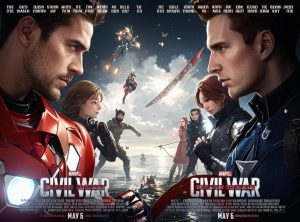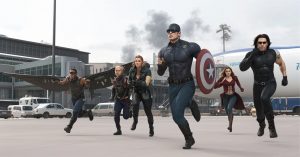Captain America: Civil War (2016) is the third film in the Captain America series within the Marvel Cinematic Universe (MCU). Directed by Anthony and Joe Russo, it follows the aftermath of Avengers: Age of Ultron and the events of Captain America: The Winter Soldier. The movie explores the growing divide among the Avengers, leading to a clash between two factions led by Steve Rogers (Captain America) and Tony Stark (Iron Man).

Plot Summary:
The central conflict revolves around the Sokovia Accords, a set of legal documents that would regulate the activities of superpowered individuals. After the Avengers inadvertently cause massive collateral damage during their missions, the United Nations proposes these Accords to control them and hold them accountable.
- Tony Stark/Iron Man supports the Sokovia Accords, believing that oversight is necessary to prevent further destruction and to protect innocent lives. He feels guilty for the chaos that has occurred and thinks that regulation is the only way forward.
- Steve Rogers/Captain America, on the other hand, opposes the Accords, fearing that they will strip individuals of their autonomy and make them pawns in political agendas. He argues that the Avengers should act based on their own moral compass, not a government’s orders.
This philosophical divide leads to a split among the Avengers:
- Team Iron Man, which includes Tony Stark, Black Widow, Vision, War Machine, and Spider-Man, supports the Accords.
- Team Captain America, made up of Steve Rogers, Falcon, Winter Soldier (Bucky Barnes), Scarlet Witch, and Hawkeye, opposes the Accords.
The film escalates into a high-stakes conflict when Bucky Barnes, Steve’s old friend and a former brainwashed assassin, becomes a target. This intensifies the division between the Avengers, culminating in a dramatic confrontation at an airport, where the heroes clash in a highly choreographed battle.
Key Themes:
- Freedom vs. Security: The movie explores the tension between individual freedom and the need for regulation and accountability. Captain America represents personal freedom and autonomy, while Iron Man represents the need for oversight to protect the public.
- Loyalty and Friendship: The relationship between Steve Rogers and Bucky Barnes is central to the story. Steve’s loyalty to his friend leads him to oppose the Accords, even when it puts him in direct opposition to his fellow Avengers.
- The Costs of Heroism: The film also grapples with the consequences of being a superhero, with characters reflecting on their past actions and the unintended consequences of their battles.
- The Emergence of New Heroes: Civil War introduces Black Panther (T’Challa), the prince of Wakanda, who is seeking vengeance for the death of his father, and Spider-Man (Peter Parker), a young hero recruited by Tony Stark.
Impact:
- The film was both a critical and commercial success, grossing over $1.1 billion worldwide.
- It was praised for its complex character dynamics, intense action sequences, and the moral dilemmas it presented.
- Civil War had a lasting impact on the MCU, deeply affecting the relationships between the Avengers and setting the stage for the events of Avengers: Infinity War (2018) and Avengers: Endgame (2019).
Captain America: Civil War is a pivotal film in the MCU, addressing both personal and political themes, and showcasing the fractured relationships within the Avengers team. It is widely considered one of the best superhero films of all time.

